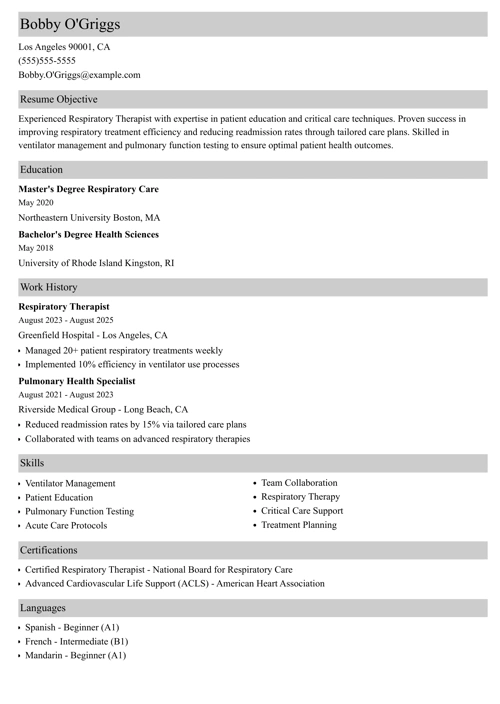Respiratory therapists are in demand, now more than ever. That also implies there will be competition for the top positions. And you’ll need the best respiratory therapist resume to make the top of the hiring manager’s list.
Just as there’s quality assurance to monitor desired clinical outcomes, there are best practices that will help you achieve the right results. For a comprehensive breakdown of those, read on.
This guide will show you:
- A respiratory therapist resume example better than 9 out of 10 other resumes.
- How to write a respiratory therapist resume that will land you more interviews.
- Tips and examples of how to put skills and achievements on a respiratory therapist resume.
- How to describe your experience on a resume for a respiratory therapist to get any job you want.
Want to save time and have your resume ready in 5 minutes? Try our AI resume builder. It’s fast and easy to use. Plus, you’ll get ready-made content to add with one click. See 20+ resume templates and create your resume here.
Sample Respiratory Therapist Resume—See more resume examples here.
Need a different kind of medical resume? See these guides:
- Medical Resume Examples
- Healthcare Professional Resume Examples
- Medical Assistant Resume Examples
- Sonographer Resume Examples
- Patient Care Technician Resume Examples
- EMT/Paramedic Resume Examples
- Patient Care Technician Resume Examples
- Radiologic Technologist Resume Examples
- Physician Assistant Resume Examples
- Resume Examples for All Professions
Sample Respiratory Therapist Resume Template
Bobby O’Griggs, RRT
bobby.q.griggs@gmail.com
774-420-7991
Professional Summary
Caring respiratory therapist RRT with 2+ years of experience, skilled in life support equipment monitoring and management. Seeking full-time position at ARRH. At BCMC, worked as respiratory therapist on 40-bed burn ward. Commended 5x by charge nurse for coolness under pressure. Received 99% positive peer review scores from staff and doctors.
Work Experience
Respiratory Therapist
BCMC
Feb 2017–March 2019
- Worked as respiratory therapist in 40-bed burn ward. Handled life support system management and monitoring. Given 99% positive peer review scores.
- Chosen to mentor 3 respiratory therapists who weren’t meeting standards. They elevated their KPI scores by an average of 35%.
- Conducted lung capacity assessments on 5 patients per week. Commended 5x by charge nurse for efficiency.
- Managed respiratory rehabilitation, following plan-of-care for 150+ patients. Received numerous written compliments from patients on my teaching style.
Volunteer Respiratory Therapist
LACH
May 2017–Jan 2017
- Volunteered 2x per week as respiratory therapist in 25-bed lung cancer ward. Conducted vital sign assessments of 5+ patients per week.
- Read 2+ chest X-Rays per week to assist physicians and nurses in creating plan of care.
Education
2015–2017 Massasoit Community College
Associate’s Degree in Respiratory Care with RRT Certification
- Excelled in equipment management coursework.
- Pursued a passion for patient education study.
Certification
Licensed RRT
Skills
- Soft skills: Teamwork, active listening, compassion, verbal communication, interpersonal skills
- Hard skills: Life support equipment management, patient education, rehabilitation, following plan-of-care
Activities
Weekly cross-fit for fun and fitness
Volunteer dog walker 2x per month
Here’s how to write a respiratory therapist resume that gets jobs:
1. Use the Best Format for Your Respiratory Therapist Resume
Make a messy respiratory therapist resume and they’ll think you’re messy.
So—
Prove you’ve got the right stuff.
These steps will get you breathing easy:
- You’re going to need to start by formatting your resume correctly. The best way is to list your last job first with the reverse-chronological layout.
- Make a header for your resume with your job title and name in big, clear type.
- Use enough white space so you don’t overtax the hiring manager’s eyes. Write with respected resume fonts.
- When deciding whether to save it as a Word document or a PDF file, use a PDF—unless the job posting says that’s a no-no.
Pro Tip: How many pages should you make your resume for respiratory therapist jobs? Go with one. The goal is to show your best moments that fit a single page.
2. Write a Respiratory Therapist Resume Objective or Resume Summary
Why don’t you get interviews?
Probably because there’s so much competition.
That’s why your respiratory therapist resume needs to wow them fast.
How?
With a winning job profile jammed with your professional accomplishments.
Are you experienced? 2+ years means you can write a resume summary. It says what you’ve done to help your past employers most.
Writing an entry-level resume for respiratory therapist jobs? Start off with a resume objective. The idea there is to share your skills.
Pro Tip: In an entry-level respiratory resume objective, add achievements from other jobs (like waitressing or retail). Use them to show your transferable skills.
3. Make a Glowing Respiratory Therapist Job Description for Your Resume
Who’s the better applicant?
Someone who was “responsible for” respiratory therapist duties?
Or an RRT who did it better than anyone?
Your respiratory therapist resume work history section has to show you’ve done it right.
- For each job, list the work title, business name, and dates of work.
- Add five bullet points—give or take. What to put in them? Your responsibilities, but also your best accomplishments.
- How can you show you’re better than the rest? By adding numbers to your “wins,” like percents or numbers of patients.
- How can you customize your resume to each job you apply to? Look in the job ad. See the skills there? Share your professional accomplishments that prove you’ve got them.
- What about your wording? You need strong resume power verbs to keep employers from dozing off.
4. Write a High-Capacity Respiratory Therapist Resume Education Section
You know your education matters.
But you probably don’t know how it can matter even more.
It’s simple—
Create a thoughtful education resume section and put lots of school achievements in it.
Each one should prove a soft skill or a hard skill.
Do it like this:
- Write your school name and degree.
- Add projects, classes you excelled in, and courses you were passionate about.
- Include teams or clubs to show your teamwork skills.
- Did you walk away with a certification? Put that in a special section right under your education.
Respiratory therapist job statistics
- Employment of respiratory therapists is projected to grow by 13-14% from 2022 to 2028, much faster than the average for all occupations [1].
- 81% of respiratory therapists work in full-time roles while 19% work part-time [2].
- To become a respiratory therapist in the US, a minimum of an associate degree from an accredited respiratory therapy education program is required [3].
5. Show Off Your Respiratory Therapist Skills
Use this respiratory therapist resume skills list:
Respiratory Therapist Resume Skills
Hard Skills:
- Life support ventilation system management
- Aerosol-based medication administration
- Blood O2 analysis
- Patient education
- Equipment monitoring
- Artificial airway management
- Lung capacity assessment
- Vital sign assessment
- Reading chest x-rays
- Respiratory rehabilitation
- Following plan-of-care
Soft Skills:
- Interpersonal relations
- Bedside manner
- Conflict resolution
- Teamwork
- Communication
- Active listening
- Cheerfulness
- Stamina
- Problem solving
- Time management
But—
Don’t just inject a lot of common skills for resumes and call it good. What did the respiratory therapist job ad say? Did it talk most about reading chest X-rays? You’d better list that then.
Pro Tip: Add skills from other jobs to your respiratory therapist resume. For instance, maybe they need someone with a lot of stamina. You can prove that with lots of other jobs.
Making a resume with our builder is incredibly simple. Follow our step-by-step guide, use ready-made content tailored to your job and have a resume ready in minutes.
When you’re done, our AI resume builder will score your resume and our resume checker will show you exactly how to improve it.
6. Add Other Sections to Your Respiratory Therapist Resume
How can you really shine?
Show your passion and skill carries over to your normal life.
Add sections for:
- Activities
- Volunteering
- Commendations
- Side hobbies
- Continuing education classes
- Fitness
7. Attach a Cover Letter to Your Respiratory Therapist Resume
Wow.
Did you know you have to have a cover letter with a respiratory therapist resume?
It’s true.
Most hiring managers appreciate a good one.
So—
Make yours one of those.
- Kick off with a well-respected cover letter format.
- Make sure you start each cover letter with a snappy hook.
- In the middle, show your passion for this job.
- Always end cover letters by teasing something like, “I’d love to explain why the charge nurse called me the best therapist she’d ever worked with.”
Pro Tip: After sending a respiratory therapist resume and cover letter, check in on your job application. Give it a few days before you nudge. Then after a week, do it again.
Plus, a great cover letter that matches your resume will give you an advantage over other candidates. You can write it in our cover letter builder here. Here's what it may look like:
See more cover letter templates and start writing.
That’s it!
That’s how to write a resume for respiratory therapist positions.
About Zety’s Editorial Process
This article has been reviewed by our editorial team to make sure it follows Zety's editorial guidelines. We’re committed to sharing our expertise and giving you trustworthy career advice tailored to your needs. High-quality content is what brings over 40 million readers to our site every year. But we don't stop there. Our team conducts original research to understand the job market better, and we pride ourselves on being quoted by top universities and prime media outlets from around the world.


![Respiratory Therapist Resume Sample [+Skills & Objective]](https://cdn-images.zety.com/pages/respiratory-therapist-resume-example-ztus-cta-02.webp)


